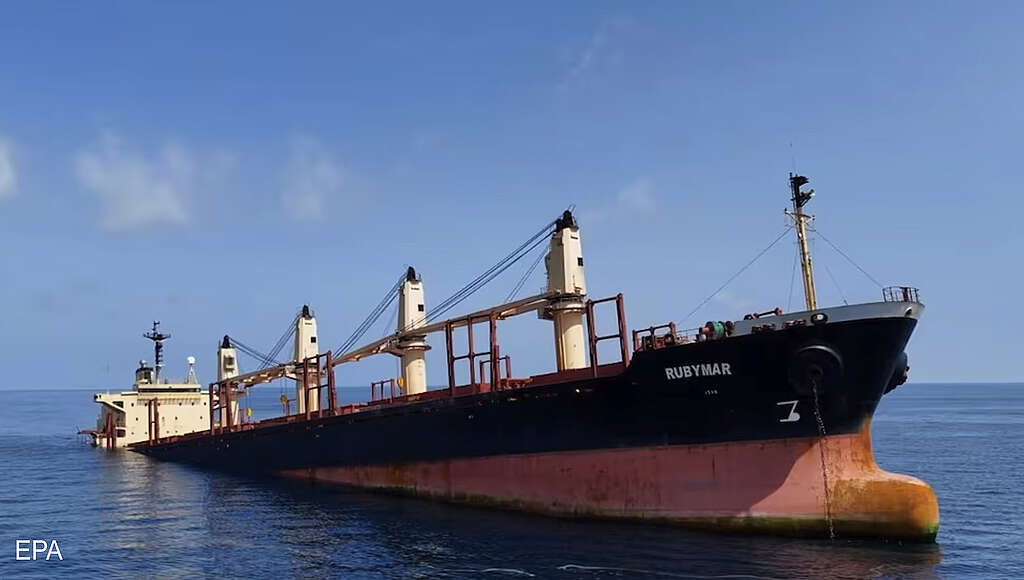There are concerns about impending environmental disaster arising from large amounts of fertilizer and oil spilled into the Red Sea by a sinking cargo ship that was attacked by Yemen’s Houthi rebels.
M/V Rubymar, a Belize-flagged vessel reportedly carrying 22,000 metric tons of toxic fertilizer, sunk after taking on water in the February 18 attack by Houthi rebels.
Join our WhatsApp ChannelAccording to an AP report, the ship had been leaking heavy petroleum for some time before it sank to the bottom of the ocean. This caused an oil slick that spread over 18 miles (30 km) across the channel, which is vital for exports of energy and freight to Europe.
Due to Israel’s offensive in Gaza, the Houthi rebels have repeatedly attacked ships in the Red Sea since November 2023. They have regularly attacked ships that have hazy or no clear links to Israel.
Traffic in the strategic channel for the transportation of goods and oil from Asia and the Middle East to Europe has already been disrupted by Houthi’s strikes. Numerous ships have already steered clear of the route.
The United States Central Command, which is in charge of the Middle East, has issued warnings in recent days about an impending “environmental disaster.”
Concerns regarding the Rubymar’s sinking are exacerbated by the Red Sea’s peculiar circular water patterns, which function as a vast lagoon by directing water northward in the winter toward Egypt’s Suez Canal and westward toward the Gulf of Aden in the summer.
“The approximately 21,000 metric tons of ammonium phosphate sulfate fertilizer that the vessel was carrying presents an environmental risk in the Red Sea,” it said in a statement. “As the ship sinks it also presents a subsurface impact risk to other ships transiting the busy shipping lanes of the waterway.”
Ahmed Awad Bin Mubarak, the prime minister of Yemen’s internationally recognized government, called the ship’s sinking “an unprecedented environmental disaster.”
“It’s a new disaster for our country and our people,” he wrote on X, formerly Twitter. “Every day, we pay for the Houthi militia’s adventures, which were not stopped at plunging Yemen into the coup disaster and war.”
READ ALSO: Israel-Hamas War: US Airdrops Aids In Gaza As Israel Agrees To Cease-fire Framework
Seafood from the Red Sea is also in high demand, particularly in Yemen, where, prior to the ongoing conflict between the Houthis and the country’s Sunni government, fishing was the country’s second-largest export after oil.
Greenpeace, an international NGO focused on the environment, has expressed worries about the ship’s sinking.
“Without immediate action, this situation could escalate into a major environmental crisis,” said Julien Jreissati, program director at Greenpeace MENA.
“As well as any further leaks of fuel oil from the engines, the sinking of the vessel could further breach the hull, allowing water to contact with the thousands of tons of fertilizer, which could then be released into the Red Sea and disrupt the balance of the marine ecosystems, triggering cascading effects throughout the food web.”
Since 2014, the Houthis have seized control of Sanaa, the capital of Yemen, driving out the government. Since 2015, the rebels and a coalition led by Saudi Arabia have been engaged in an unending war.
The Houthis have maintained that their strikes will not end until Israel ends its combat operations in the Gaza Strip.
Victor Ezeja is a passionate journalist with seven years of experience writing on economy, politics and energy. He holds a Master's degree in Mass Communication.




















Follow Us